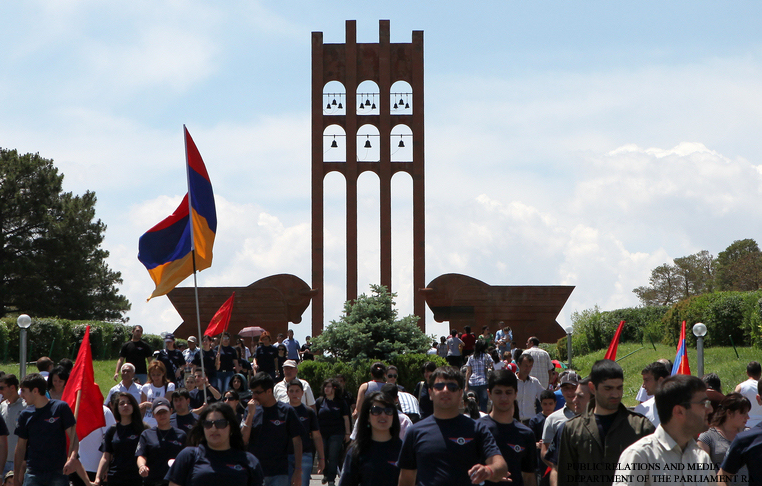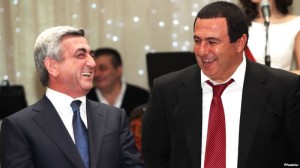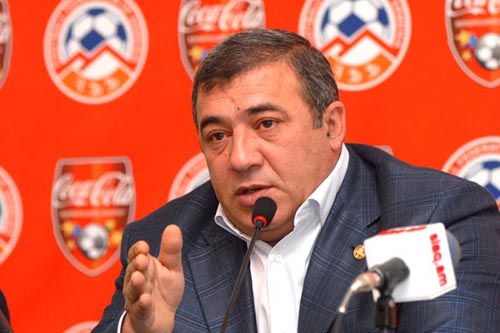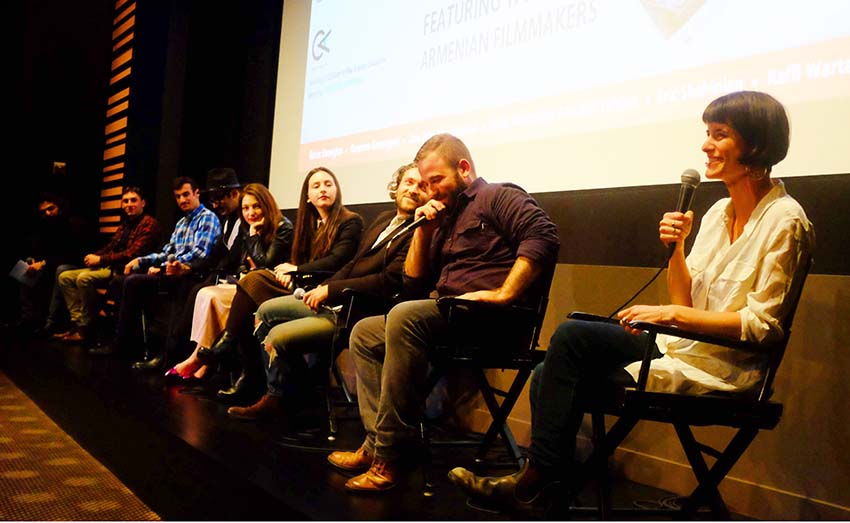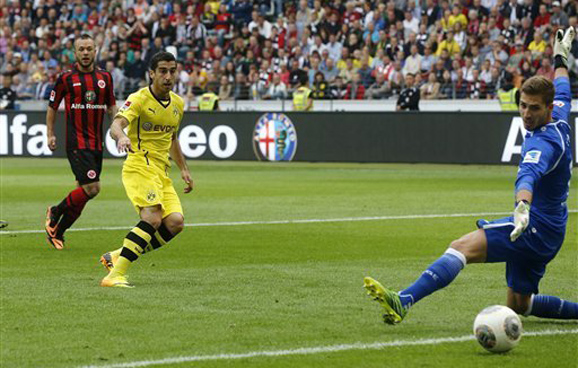After 2 1/2 weeks of rumors and behind-the-scenes horse-trading, the leader of Armenia’s second-most-powerful political party announced on May 24 that he did not consider it expedient to enter a coalition government with President Serzh Sarkisian’s Republican Party of Armenia (RPA).
Wealthy entrepreneur Gagik Tsarukian issued a statement explaining that while his Prosperous Armenia Party (PAP) garnered some half a million votes in the May 6 parliamentary election, that was not enough to give it “the constitutional possibility of forming a government and implementing its programs.” At the same time, Tsarukian stressed that the PAP intended to play “a strictly constitutional, balanced role” in political life.
PAP parliament-faction member Naira Zohrabian confirmed on May 25 that the party will not join the government. She said the PAP’s four ministers in the outgoing cabinet would tender their resignations when the new parliament met for its first session on May 31. Three of them have since vacated their offices in the government building. Observers are nonetheless divided as to whether the PAP will openly take on the role of an opposition party, or continue to support and cooperate with the RPA.
Tsarukian founded the PAP in 2006. The party emerged as the second-largest parliament faction in the 2007 parliamentary elections, with 25 of the 131 mandates (compared with 62 for the RPA), and formed a coalition with the RPA, which the Armenian Revolutionary Federation — Dashnaktsutiun (ARF) subsequently joined. Those three parties formed a new coalition, together with the Law-Based State (OY) party, following Sarkisian’s election as president in 2008.
But over the past couple of years, Tsarukian has progressively distanced himself from the coalition. In the run-up to the parliamentary election campaign he repeatedly ruled out participating as part of an election bloc with the RPA. And in early April the PAP, together with the ARF and the opposition Armenian National Congress (ANC) headed by former President Levon Ter-Petrossian, formed an Interparty Center for Public Oversight of the Elections with the aim of preventing fraud and vote-rigging by the RPA. Veteran analyst Aleksandr Iskandarian commented that in the course of the election campaign, the PAP adopted an even more radical opposition stance than the ANC.
The official results of the May 6 elections, which the Interparty Center for Public Oversight of the Elections said in a statement did not accurately reflect the number of votes cast for the seven parties and one bloc competing, gave the PAP a total of 37 mandates, compared with 69 for the RPA.
Coalition Talks?
Tsarukian’s announcement that the PAP will not form a coalition with the RPA was unexpected in light of remarks just days earlier by another prominent PAP member and by OY Deputy Chairwoman Heghine Bisharian. Hmayak Hovannisian, who won election to the new parliament on the PAP party list, was quoted by Regnum on May 19 as saying the PAP and RPA had reached agreement in principle on forming a coalition.
Two days later, he similarly told RFE/RL’s Armenian Service that “at present we are talking about clarifying terms,” meaning which government positions the PAP would receive. Hovannisian revealed that “Prosperous Armenia certainly wants to get the post of prime minister and thus have the Republican Party indirectly recognize that the official election results do not reflect the real picture of popular support for political forces.”
Should the RPA finally reject that demand, the PAP could be offered additional ministerial posts, he added. But in an apparent contradiction, Hovannisian also said the PAP was trying to distance itself from the Interparty Center for Public Oversight of the Elections joint statement.
Interviewed by the independent daily “Aravot” on May 23, however, RPA spokesman Eduard Sharmazanov downplayed the reports that the PAP was demanding the post of prime minister in the new coalition government. “I don’t think that they in the PAP are so naive as to raise such an issue with us,” Sharmazanov said. “Both the prime minister and the chairman of the National Assembly will be from the Republican Party.” He also indicated that the current prime minister, Tigran Sarkisian, would retain his post.
The Russian news agency Regnum for its part quoted an unnamed “source close to the RPA” as saying that the PAP was not laying claim to the prime minister’s post, but simply did not want Tigran Sarkisian to retain it.
Meanwhile, on May 22, OY Deputy Chairwoman Bisharian told RFE/RL her party, which won six parliament mandates, had reached a deal on joining a coalition with the RPA. She said talks between the two parties and the PAP were continuing on “clarifying terms.” “Once this negotiating process is over, I think that a coalition will be formed by these three political forces,” Bisharian said.
Iskandarian described the negotiations between the RPA and the PAP as an attempt to find a balance between what the PAP could offer and what it was demanding in return. He warned that if the PAP “gets back into bed with the RPA” it risked losing many supporters.
‘Real Opposition’
It seems nonetheless that this was a risk Tsarukian was prepared to take: if his sole reason for not forming a coalition was that the PAP did not win a majority of parliament seats, why did it take him nearly three weeks to say so publicly? It is more probable that, in the words of former Prime Minister and senior ANC member Hrant Bagratian, the PAP did not get whatever it was it was demanding from the RPA in return.
The ANC nonetheless hailed Tsarukian’s announcement that the PAP will not join a new coalition government. “The decision by the Prosperous Armenia Party shows that the government monolith that showed cracks ahead of the elections is now falling apart,” an ANC statement said. “Political developments in the country show that the ANC’s strategy that was adopted in October 2011 and aimed at eroding the political monopoly of Serzh Sarkisian’s Republican Party…was an accurately calculated step that is contributing to the regime’s political isolation.”
ANC coordinator Levon Zurabian struck a note of caution, however, pointing out that although the PAP’s refusal to enter a coalition means that it is “technically” now in opposition, it is for the PAP to decide whether it will join the “real opposition.”
Stepan Safrastian of the Zharangutiun (Heritage) party that lost two of its previous seven parliament mandates seemed convinced that the PAP will not move into open opposition for fear of jeopardizing its members’ considerable commercial interests. “I can’t imagine that in a country like Armenia, big business will leave the government and remain as protected as it has been in the government,” Safarian told reporters.
Prime Minister Sarkisian too has questioned the PAP’s intentions. Asked by a journalist in Shirak province how the RPA views the PAP’s joining the opposition, Sarkisian asked rhetorically “Who said the PAP will be in opposition?” But assuming that the rumors that the PAP was demanding his ouster are true, Sarkisian has little reason to be kindly disposed toward it.
The ARF, which quit the outgoing coalition in the spring of 2009 to protest President Sarkisian’s efforts to establish diplomatic relations with Turkey has formally announced it will not join a new coalition.
As for Zharangutiun, its leader Raffi Hovannisian (no relation to Hmayak) released a statement on May 15 deploring the “imposition” on the Armenian people “in defiance of civil liberties, constitutional rights, and an unfettered expression of the national will” of a “de facto legislature.” He said Zharangutiun would announce its future plans at a congress on June 2.


